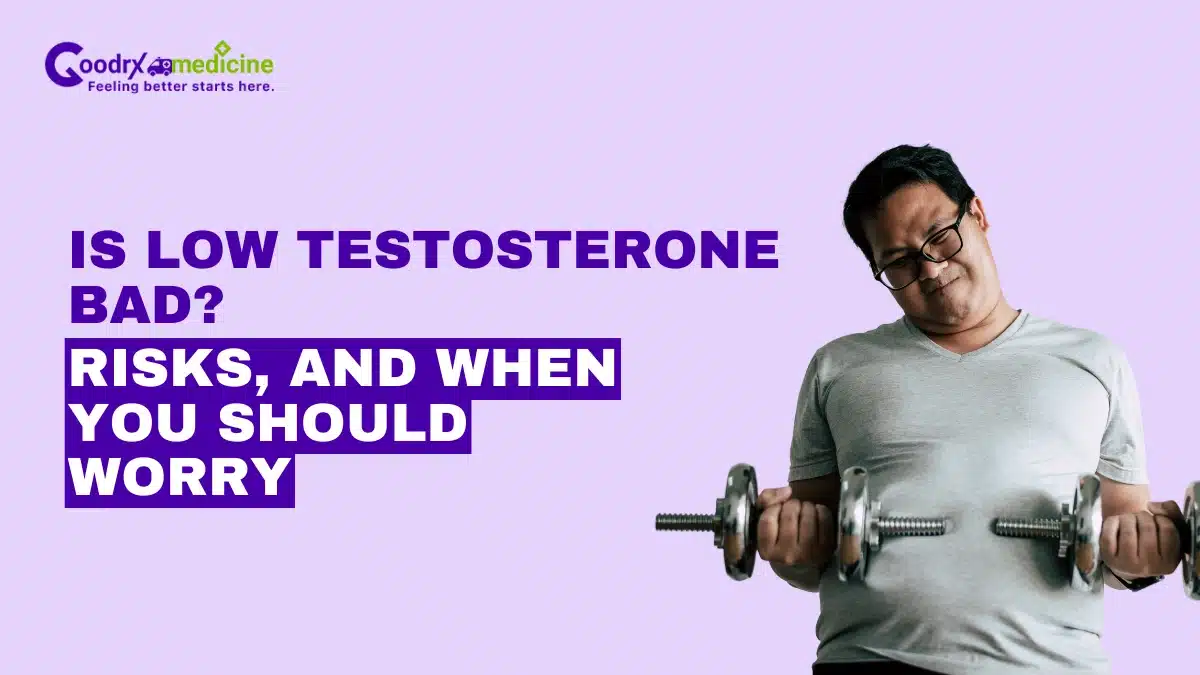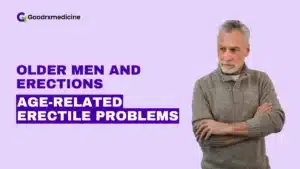Testosterone is not just a hormone linked to masculinity; it is an important regulator of several processes in the human body, including muscle strength, bone health, Red Blood Cell (RBC) production, and mental well-being.
When levels fall below normal, it raises an important question: Is Low Testosterone bad for you? The answer is not the same for everyone.
While some may experience little to no effect from slightly lower levels, others may face a wide range of health challenges. The impact depends on how low the levels are, how long they remain that way, and whether symptoms are present.
In this article, we examine exactly why Low Testosterone can be a concern, the situations where it might not be harmful, and how to manage its effects.
When Low Testosterone becomes a problem
Low Testosterone or Low T becomes a problem when it disrupts normal body functions. If levels drop significantly, it can affect:
- Sexual health: Reduced sex drive, difficulty achieving erections, and lower sperm production
- Muscle and bone strength: Loss of muscle mass, increased body fat, and higher risk of Osteoporosis
- Mental health: Mood swings, irritability, Depression, or lack of motivation
- Energy and focus: Persistent fatigue, trouble concentrating, and reduced physical stamina
In these cases, Low Testosterone is more than just a lab result; it is a condition that can affect the quality of life and cause long-term health risks.
Save up to 90% on your medicine bills
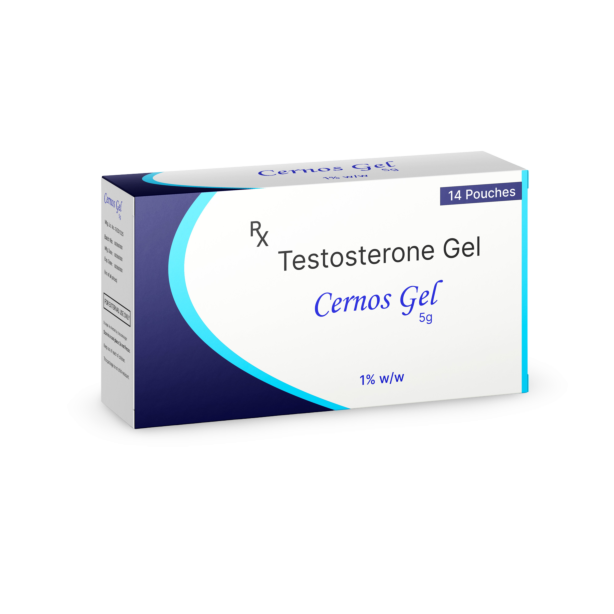
Cernos Gel 1% w/w
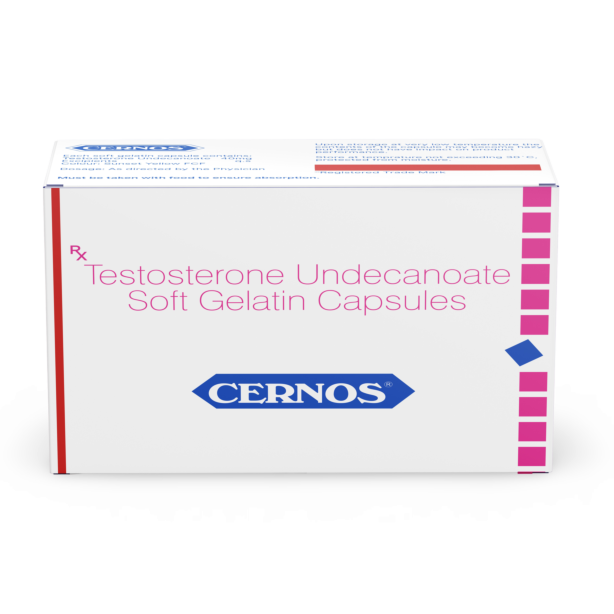
Cernos 40 mg Soft Gelatin Capsule

Sustanon 250 Injection
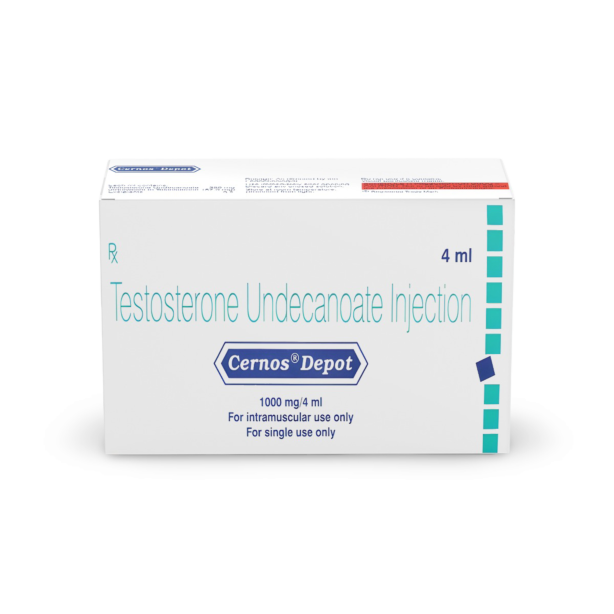
Cernos Depot 1000 mg Injection
Is Low Testosterone bad?
Not always. A mild reduction in Testosterone, especially as part of natural aging, does not automatically cause harm. Many men over 40 experience a gradual decline without major health issues.
Low Testosterone may not be bad if:
- It is only slightly below the normal range.
- No significant symptoms are present.
- Healthy lifestyle habits are maintained.
- The drop is temporary due to stress, illness, or weight changes.
The key factor is whether symptoms and measurable health changes are present. Numbers alone do not tell the whole story.
Why Low Testosterone can be harmful
When Testosterone remains too low for a long time, it can lead to:
- Sexual dysfunction: Low levels can cause reduced libido, weaker erections, and lower semen volume. In women, it can lead to reduced sexual satisfaction.
- Muscle and bone loss: This hormone supports muscle protein synthesis and bone mineral density. Without enough Testosterone, muscle mass can shrink, and bones become more fragile, increasing fracture risk.
- Weight gain and metabolic issues: Low Testosterone leads to increased fat, particularly around the waist. It is also connected to insulin resistance, which can increase the chances of getting Diabetes.
- Long-term health risks: Over time, severe Testosterone deficiency can contribute to cardiovascular disease, reduced immunity, and poorer overall health.
- Mood and cognitive decline: Testosterone helps regulate mood and mental clarity. A shortage can lead to irritability, Anxiety, Depression, and difficulty focusing.
When Low Testosterone might not be a serious concern
In certain situations, Low Testosterone is not necessarily harmful:
- Natural aging: A slow, steady decline that does not cause troubling symptoms may not need aggressive treatment.
- Short-term drops: Levels can temporarily dip due to illness, stress, or calorie restriction, and may recover naturally.
- Individual variation: Some people function well at levels that would be considered low for others.
The focus should be on the individual’s symptoms and well-being, not just lab numbers.
Can Low Testosterone be managed?
Yes, Low Testosterone can often be managed through changes in your lifestyle, medical treatment, or a combination of both.
Lifestyle approaches
These are some basic lifestyle adjustments that can help:
- Exercise regularly: Especially resistance training and high-intensity workouts.
- Eat a balanced diet: Include protein, healthy fats, and micronutrients like zinc and vitamin D.
- Maintain a healthy weight: Excess fat can lower Testosterone further.
- Get enough sleep: Poor sleep affects hormone production.
- Reduce stress: High cortisol levels suppress Testosterone.
Medical approaches
When symptoms are significant and confirmed by testing, a doctor can prescribe Testosterone Replacement Therapy (TRT). This can be administered via injections, gels, patches, or pellets.
TRT can improve mood, energy, muscle mass, and sexual function. However, it comes with possible risks such as acne, fluid retention, and changes in RBC count, so monitoring is essential.
Risks of ignoring Low Testosterone
If Low Testosterone is causing symptoms and is left untreated, the potential risks include:
- Reduced quality of life due to fatigue, low libido, and mood problems
- Loss of bone density leading to fractures
- Higher body fat and increased risk of metabolic syndrome
- Reduced muscle strength, impacting daily activities
Addressing Low Testosterone early can help prevent these outcomes.
Conclusion
So, is Low Testosterone bad? It is not automatically harmful, but it should never be ignored when symptoms are present. A slight, age-related decline may not require attention, yet continuous or significant drops can affect sexual health, physical strength, mood, and long-term health.
The key is to look beyond numbers on a blood test and focus on how Testosterone levels impact daily life. If you experience ongoing fatigue, low libido, mood changes, or muscle loss, timely testing and professional guidance are essential.
With the right lifestyle changes, medical support, or a combination of both, it is possible to restore balance, improve the quality of your life, and reduce future health risks. Low Testosterone is only truly bad when it goes unnoticed and untreated.

Frequently Asked Questions
How does Low Testosterone affect women?
Although women naturally have lower Testosterone than men, a significant drop, often after Menopause, can cause fatigue, low libido, and weaker bones. In women, Low Testosterone is less discussed but can still impact quality of life.
Does Low T impact immune system function?
Yes, it has been found that Testosterone influences immune responses. Extremely low levels of Testosterone may weaken the body’s ability to fight infections and slow down recovery from illness or injury.
Can certain diets worsen Low T ?
Yes, highly processed foods, excessive sugar, and very low-fat diets can negatively affect hormone production, including Testosterone. A nutrient-rich diet with healthy fats, lean proteins, and vegetables supports better hormone balance.
Is Low T linked to memory problems?
Yes, some studies indicate that men with Low T may experience reduced verbal memory, slower thinking, or difficulty concentrating. Maintaining healthy hormone levels may help protect cognitive function over time.
When referencing outside resources, GoodrxMedicine always provides full citations. To learn more about the measures we use to maintain the quality of our content, please review our Content Information Policy.



